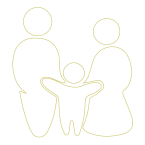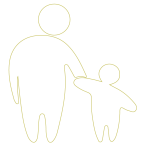Signs Your Child May be Depressed and Ways to Help
While all children and youth go through different moods and emotional responses to daily challenges, coping skills like exercise, deep breathing, talking with friends and family, and listening to music usually help us feel better. However, when it becomes harder to manage our feelings; when we have difficulty going to work or school; when we do not want to see our friends and feel hopeless, these are all signs and symptoms of depression and may require an appointment with your doctor.
Depression can be experienced by anyone at any time. According to the World Health Organization (WHO), approximately 280 million people in the world have a diagnosis of depression. 3.1 million young people between the ages of 12 and 17 have experienced at least one major depressive episode in the past year in the United States. 2 to 3 percent of children ages 6 to 12 may have serious depression. At its worst, depression can lead to suicide. Over 700,000 people die due to suicide every year. Suicide is the fourth leading cause of death in 15-29-year-olds.
There are 3 main types of depression in youth, disruptive mood dysregulation disorder, major depressive disorder, and persistent depressive disorder. Symptoms of depression in children and teens can include loss of interest in hobbies, depressed mood, outbursts of anger, significant weight loss, difficulty concentrating, and getting very little or too much sleep.
Sadness is part of the human condition, but lack of hope and lack of feeling worthwhile are not. If a child feels hopeless it is not because there is no hope at all in their life. It is because they feel there is none. This is the same for worthlessness. No one is worthless. Our lives are all worth something. A child feeling that they are worthless is an issue that should be addressed.
The causes of childhood depression are unknown. It could be caused by any combination of factors including physical health, life events, family history, environment, genetic vulnerability, and biochemistry. About one out of every 40 children in the U.S. suffers from childhood depression. Under the age of 10, depression is more common in boys but by age 16, girls have a greater incidence of depression. The National Institute of Mental Health (NIMH) funded a study which showed that a combination of medication and therapy is the most effective treatment for depression in adolescents.
While therapy and medication should be discussed with your child’s pediatrician, there are additional lifestyle changes one could also make to assist with symptoms of depression. Food and drink choices cause your blood sugar to rise and fall, which can also affect your depression and/or anxiety levels. It is important to encourage a healthy eating pattern for children and adolescents as this will help set the stage for a lifetime of healthier, independent choices.
Here are a few common foods and drinks that are linked to depression and anxiety as well as recommended substitutions for them.
Fruit Juice: The fiber in whole fruit fills you up and slows down how your blood takes in energy. Without that fiber, you’re just drinking nutritious sugar-water that can quickly make your blood sugar rise and fall. That can leave you hungry and angry. That will not help anxiety and depression. Recommendation: Eat pieces of fruit. When you’re thirsty, drink water.
Regular Soda: It has all of the blood-spiking sugar of fruit juice with none of the nutrition. Sugar-sweetened drinks have a direct link to depression. Recommendation: Try seltzer with a splash of juice instead, or add fruit/herbs to water (strawberry/mint/lemon/ lime /orange/cucumber).
Diet Soda: You may not have the energy crash that comes with having too much sugar, but diet soda may be linked to depression. Artificial sweeteners also trigger insulin, which sends your body into fat storage mode and leads to weight gain. Recommendation: Drink water
Coffee: Caffeine can make you jittery and nervous. It could also mess up your sleep. Neither helps anxiety or depression. Recommendation: Try cutting out caffeine slowly. Decaffeinated coffee can actually help make you feel less depressed.
Energy Drinks: They can cause abnormal heart rhythms, anxiety, and sleep issues. It’s not always easy to know the sky-high caffeine levels hidden in ingredients like guarana. These beverages often have loads of sugar or artificial sweeteners, too. Recommendation: Drink water and talk to your pediatrician about adding a multi-vitamin to your child’s diet.
White Bread: The highly processed white flour it's made from quickly turns to blood sugar after you eat it. That can cause energy spikes and crashes that can be bad for anxiety and depression. Recommendation: Eat whole grain bread
Light Dressing/Marinades: Many get their sweetness from aspartame, and we already know that is linked to depression and weight gain. Recommendation: Experiment with oils, vinegar, fresh or dried herbs/spices or wholesome dressings
Ketchup: Ketchup has four grams of sugar per tablespoon, to be exact. And the “light” stuff may have artificial sweeteners that could be linked to anxiety and depression. Recommendation: Try salsa or mustard instead
Frosting: It has around 2 grams of "trans fats" per serving. They're linked to depression. Sometimes called “partially hydrogenated oils,” they’re also in fried foods, pizza dough, cakes, cookies, and crackers. Recommendation: Check your labels. If you do eat fat, try and make it the “good” kind you get from foods like fish, olive oil, nuts, and avocado. Those can lift your mood.
Doughnuts: These have all of the wrong kinds of fats, snow-white flour, and minimal fiber to slow down absorption. They also have lots of added sugar. Recommendation: Make it a treat every now and then but not something you eat on a regular basis.
Processed Foods: Eating processed meat, fried food, refined cereals, candy, pastries, and high-fat dairy products, you’re more likely to be anxious and depressed. Recommendation: A diet full of whole fiber-rich grains, fruits, vegetables, and fish can help keep you on a more even keel. Instead of frozen pizza, freeze individual slices of pizzeria pizza; instead of processed chicken nuggets, try rotisserie chicken or make homemade nuggets and freeze; try baking instead of frying (air fryers are wonderful!), make homemade waffles/pancakes and freeze, make taco meat ahead of time and freeze for an easy dinner.
For more information on the many different types of depression, please visit:
https://www.mayoclinic.org/diseases-conditions/depression/symptoms-causes/syc-20356007
https://www.nimh.nih.gov/health/publications/disruptive-mood-dysregulation-disorder
https://www.nimh.nih.gov/health/statistics/persistent-depressive-disorder-dysthymic-disorder
https://www.mhanational.org/depression-teens-0



